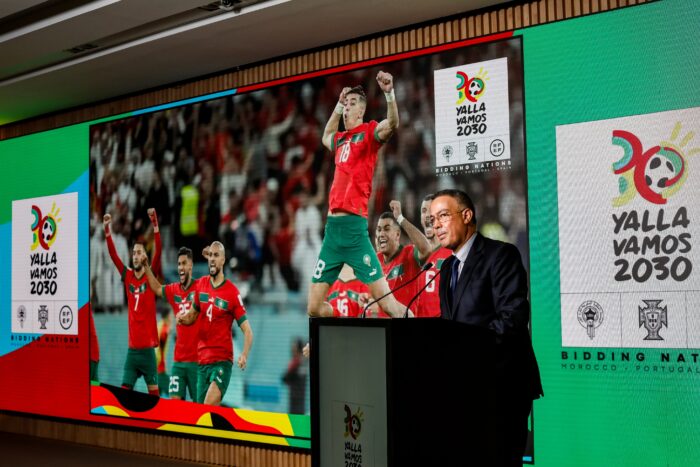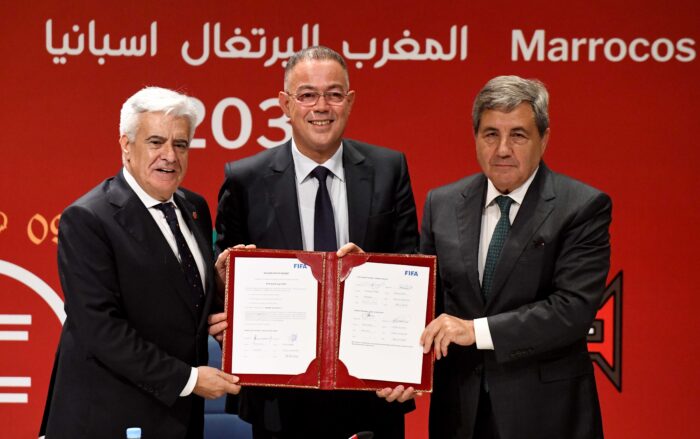While infrastructure and logistics naturally occupy a crucial place, two strategic and innovative concepts stand out: the involvement of Moroccans living abroad (MRE) and the African scope of the project. These dimensions, unusual in the context of such events, reflect a Moroccan vision that goes far beyond sport.
MREs at the heart of national mobilization
For the first time in the history of World Cup organization, a national diaspora is involved in the preparation and organization process. Fouzi Lekjaa announced the creation of an expanded committee, including representatives of the MRE community, with the aim of involving this community in the success of the event.

With more than 5 million Moroccans living abroad, the diaspora is a dynamic and multi-dimensional asset for the country. It represents not only an economic driving force, with financial transfers exceeding 100 billion dirhams annually, but also a pool of expertise and international connections.
For Jalal Bouzrara, sports journalist and presenter of the Dream Team program on MBC 5, this initiative fits in perfectly with Morocco’s political vision, as espoused by King Mohammed VI: « The sovereign often reminds us in his speeches that there are no Moroccans ‘from Morocco’ or ‘from abroad’. This World Cup concerns all Moroccans. The skills of MREs are invaluable, and many of them shine throughout the world », he tells TelQuel.
« MREs will have to have both a strategic and an advisory role. Obviously, I don’t know the details of the organization, but in my opinion, they will be both standard-bearers for this Moroccan World Cup and active contributors thanks to their skills, whatever their size or field of expertise, » he explains.
For Nabil Adel, director of the geopolitics and geoeconomics research group at the ESCA business school, this approach raises a number of questions: « Will this committee be a formal structure? Will the contribution of MREs be financial or merely consultative? » He adds: « This kind of mobilization is often put in place before an event of this scale is awarded, with a view to lobbying. Once the organization has been awarded, as is already the case for Morocco, we have existing structures to manage this type of project. Public Works, the Ministry of Sports, the Ministry of Finance, as well as other government departments will take charge of their respective components. »
« The role of the MREs will probably be limited to their intellectual expertise, particularly in specific fields linked to organization, or to a representation role with foreign powers », according to Adel.
A World Cup in Africa’s colors?
The other strategic plan unveiled at the Council of Ministers, albeit more subtle, concerns the African dimension of the project. The organization of the 2030 World Cup is part of a vision that embraces the entire African continent, already initiated by King Mohammed VI’s announcement of the presentation of the joint bid in March 2023 in Kigali, Rwanda.
For Bouzrara, this African vision is essential to give a broader meaning to the event. « Morocco, as a leader on the African continent, also wants this to be an African World Cup, with African skills, young Africans, and African volunteers. It won’t just be a project for one country, but for an entire continent. The inclusion of African youth, businesses and skills is essential. Today, we can see the dynamism of African youth and African startups, which are gaining influence on the international scene. It’s an inclusive initiative that can only enrich the project, » he says.

This positioning is also supported by Morocco’s already well-established sports diplomacy. « Morocco has been developing a real sports diplomacy for several years now. Just look at the calendar of competitions: the next Men’s and Women’s African Cup of Nations will be held in Morocco. Youth competitions and the U17 Women’s World Cup will be held here. Added to this are the agreements signed between the Royal Moroccan Football Federation and more than a dozen African federations. These initiatives strengthen Morocco’s position on the continent, » Bouzrara points out.
However, « the most important thing is not to have isolated talents, but to guarantee good organization, good management, and solid governance to coordinate these talents », according to Adel. « Calling on African expertise is an excellent idea. It reflects a desire for openness and continental collaboration. However, in concrete terms, African expertise directly applicable to the organization of a World Cup is limited. Only South Africa has direct experience, having already organized the World Cup in 2010. This expertise could be extremely valuable for Morocco, but our relations with South Africa are not particularly cordial at the moment (Pretoria supports the Polisario’s positions, editor’s note) », he recalls.
Qatar’s experience in organizing the 2022 World Cup can also be « a source of inspiration », said Adel. « However, in this initiative, it seems that Morocco is turning more to its African brothers than to Arab countries », he points out.
« We need a structure capable of federating these contributions, defining expectations and putting in place a clear roadmap. Otherwise, we run the risk of ending up in a situation where major initiatives are announced without being translated into concrete action. Strong leadership will be essential to coordinate all these efforts, » he concludes.
Written in French by ElMehdi El Azhary; edited in English by The AngloMedia Group




